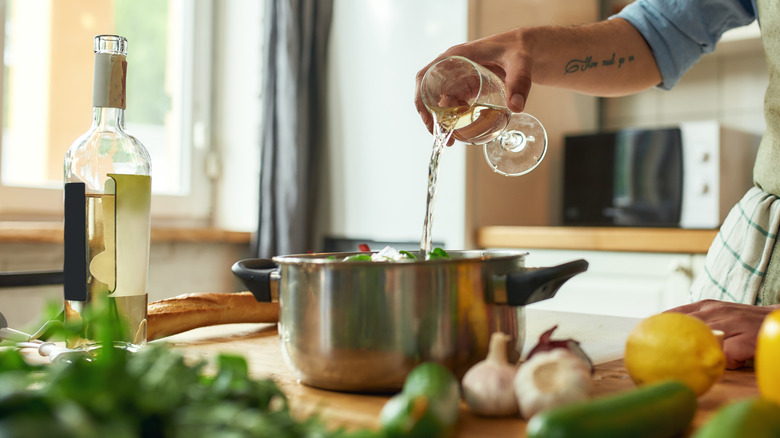Why Cooking With The Cheapest Wine Could Be A Big Mistake
Whether it be for a simple risotto or a classic beef bourguignon, if your recipe calls for wine, you might be tempted to reach for the cheapest bottle available. Because the wine is being mixed with other ingredients, it's easy to assume that any type of wine will do. And don't you want to save the really good stuff for drinking, anyway?
However, according to Bon Appétit, that's not the case at all. In fact, it's quite the opposite. All the underlying flavors in the wine will remain just as prominent even when cooked down, and that means the quality of wine does make a difference in the final outcome of the dish. In the same way that a fruity wine will produce an equally fruity sauce or glaze, a poor quality wine will only serve to cheapen the overall taste of your recipe. So while it may be convenient to use up that old bottle of wine that's been sitting in the back of your fridge, unfortunately, it won't be worth it in the end.
What are the best wines to cook with?
So, what's the solution here? As MasterClass states, the general rule of thumb when cooking with wine is to not use anything you wouldn't drink on its own. That doesn't necessarily mean that you should always go for the most expensive bottle, however, so don't worry about the state of your bank account too much.
Instead, pay attention to the wine's sugar content. As MasterClass explains, sugary wines might unpleasantly alter the taste of savory dishes. The sugars may even caramelize and overcook, giving the final meal an unwanted flavor. Dry wine is generally your best bet for cooking.
As for choosing between reds and whites, know that red wines produce bolder flavors, while white wines produce lighter ones. Red wine is also typically high in tannins, which makes for a chalkier mouthfeel. Meanwhile, white wine tends to be relatively high in acidity, a characteristic that retains moisture and helps to break down protein. Ultimately, it's all a matter of what flavor and texture you're going for — just make sure to avoid picking your wine based on the price tag alone.

